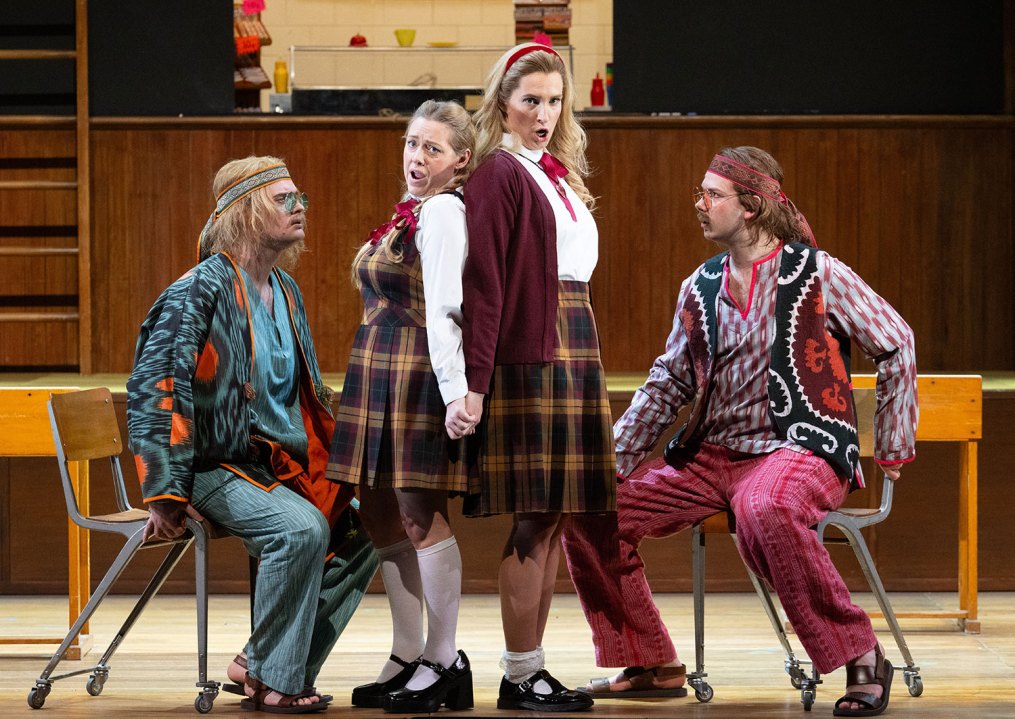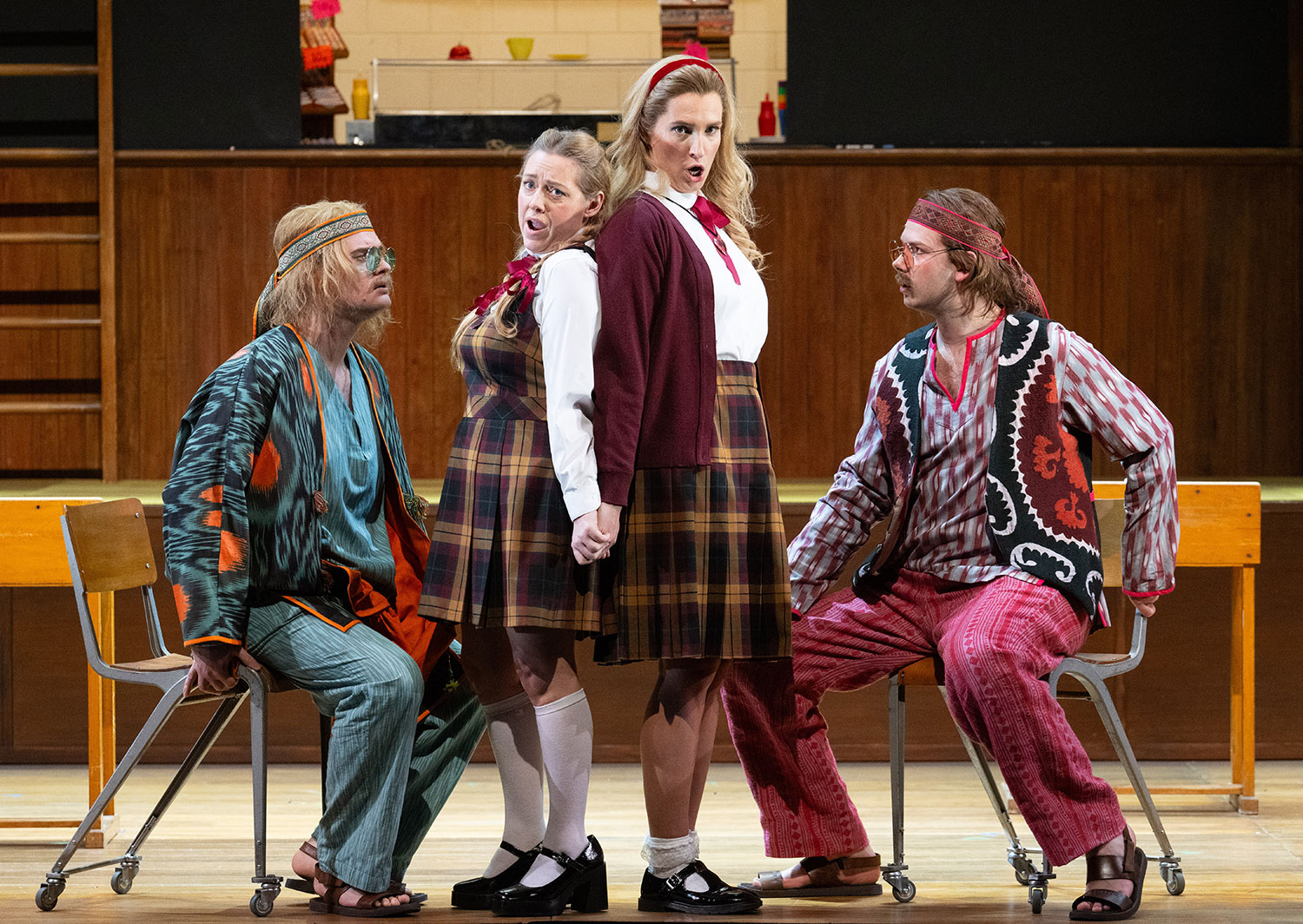Mozart’s Cosi fan tutte hasn’t always been taken seriously. In fact for much of the 19th century it wasn’t even reckoned to be very good (Donald Tovey described its characters as ‘humanly speaking, rubbish’). For the modern director, there are several potential approaches. One – the hardest – is to try and evoke in the audience an approximation of a late-18th-century mindset. Another, scarcely easier, is to go all-in on psychological subtlety – the path taken by Tim Albery in the current Opera North production. A third is simply to play the whole thing as a saucy romp with a beautiful score, and that’s the choice that Max Hoehn has taken in his new staging for the Welsh National Opera.
The problem with sustained visual metaphors is that you have to keep decoding everything you see
Hoehn has one major new insight. Noticing that the opera’s subtitle is ‘The School for Lovers’, he’s set the whole thing in – wait for it, because this is how directors earn their money – a school. Literally: there are desks and a blackboard, and Ferrando (Egor Zhuravskii) and Guglielmo (James Atkinson) wear blazers and shorts. Their fiancées (who in this set-up can’t be more than sixteen) are also in school uniform, and Fiordiligi (Sophie Bevan) is the smarter of the two. Dorabella (Kayleigh Decker) is more careless; her socks are around her ankles. Don Alfonso (Jose Fardilha) is a Bash Street Kids headmaster in mortarboard and gown, and Despina (Rebecca Evans) is a dinner-lady. Enormous anatomical drawings of reproductive organs (human and other) dangle over the scene.
I mean… it’s not just me, is it? Sure, attitudes to teenage sexuality vary with time and place. When I taught in Sri Lanka in the 1990s, Colombo 7 playboys in hulking SUVs would queue to collect their pinafored and pigtailed girlfriends, straight from class. And Despina does have that aria about the myriad ways that a woman of ‘quindici anni’ should torment her lover. It doesn’t do to be over-literal: Hoehn is giving us a cartoon, a metaphor. But the problem with sustained visual metaphors is that you have to keep decoding everything you see. That’s not theatre; it’s homework. Meanwhile, your eyes present you with adults dressed as children in a school whose staff take a distinctly clammy interest in their pupils’ love lives. This place would be put into special measures within a week.
Anyway, if you’re basically cool with that – and the Cardiff audience laughed a lot – you should know that the whole misguided concept is realised with huge gusto and visual flair (the designs are by Jemima Robinson). The chorus, in particular, was having a hoot as the playground gang – scrapping, skylarking, gleefully trashing the joint. The central cast, too, was committed to the premise. Evans made an enjoyably salty Despina and the musical values were splendid throughout, from Tomas Hanus’s trim, effervescent conducting to the delicately shaded expression and lovely, eloquent phrasing displayed by both Bevan and Decker.
When a production of Cosi fan tutte is going astray, Fiordiligi tends to emerge as the most compelling character. That was the case here, though in truth the whole company deserved better. Perhaps the best way to approach Hoehn’s staging is as an unusually pervy period-piece designed to reveal Cosi the way the Victorians saw it – a pointless, rather unsavoury farce with inexplicably wonderful music. It brought to mind that line from Jurassic Park: Hoehn and his team were clearly so preoccupied with whether or not they could, they didn’t stop to think if they should.
The Royal Opera has revived a different Albery production; his 2009 staging of The Flying Dutchman, with Bryn Terfel returning to the title role. In 2011, Michael Tanner was underwhelmed by the visuals – a semi-abstract expanse of steel plates and hawsers which might plausibly represent a ship, particularly if you’ve never been near one. There is a puddle of water downstage, in which characters occasionally splash about, accompanied by dripping and plopping sounds. It’s a curious way to represent the elemental power of the ‘proud ocean’.
But the overpowering gloom is certainly compelling, in a gothicky sort of way – not wholly inappropriate to the roots of Wagner’s inspiration. And then there’s the cast: Stephen Milling’s bluff Daland, Elisabet Strid as a sweet-toned, frantic Senta and of course Terfel himself, whose opening monologue initially sounded so blanched and stentorian that you feared for his voice – but which grew, thrillingly, in amplitude and expressive power. The love duet soared with a fierce, desperate hope; and in the quieter passages, Terfel drew the atmosphere in around him with a lieder-singer’s sensitivity to the text. Henrik Nanasi, conducting, had a powerful command of the score’s silences; especially when set against boisterous choral singing and the restless swell of the Royal Opera House Orchestra, whose principal oboe, Christopher Cowie, covered himself in glory.







Comments